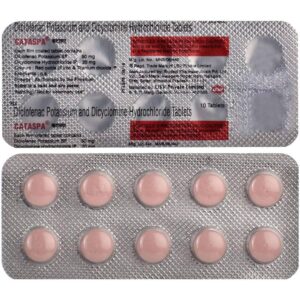DICYCLOMINE + DICLOFENAC
Dicyclomine: Dicyclomine is a drug that is commonly used to relieve symptoms associated with irritable bowel syndrome (IBS). It belongs to a class of medications called anticholinergics, which work by relaxing the smooth muscles in the walls of the intestines and reducing muscle spasms.
The recommended dose of dicyclomine for adults is usually 20 mg, taken four times a day, before meals and at bedtime. However, the dosage may vary depending on the individual’s response to the drug and their specific condition.
Some common side effects of dicyclomine may include dry mouth, dizziness, blurred vision, drowsiness, difficulty urinating, and increased sensitivity to light. These side effects are usually mild and temporary. However, serious side effects such as fast or irregular heartbeat, severe abdominal pain, difficulty breathing, or signs of an allergic reaction (rash, itching, swelling) should be immediately reported to a healthcare professional.
Dicyclomine should not be taken by individuals who have certain medical conditions, such as glaucoma, urinary retention, severe constipation, or certain gastrointestinal disorders. It is also important to inform the healthcare provider about any other medications or supplements being taken, as dicyclomine may interact with them.
Overall, dicyclomine is an effective medication for the symptomatic relief of IBS. However, it is important to follow the prescribed dosage and consult with a healthcare provider for proper use and to monitor for any potential side effects.
Diclofenac: Diclofenac is a nonsteroidal anti-inflammatory drug (NSAID) commonly used to treat pain and inflammation caused by various conditions such as arthritis, menstrual cramps, and muscle strains.
Mechanism of Action:
Diclofenac works by inhibiting the production of prostaglandins, which are substances in the body that cause pain, inflammation, and fever. By blocking the action of these prostaglandins, diclofenac helps to reduce pain and inflammation.
Use:
Diclofenac can be taken orally as tablets, capsules, or liquid suspension. It is also available as a gel or cream for topical application. The drug can be used for short-term relief of pain or as a long-term treatment for chronic conditions like arthritis.
Dose:
The appropriate dose of diclofenac varies depending on the condition being treated and the formulation of the drug. The recommended oral dose for adults is usually between 50-150 mg per day, divided into multiple doses. The topical gel or cream is applied to the affected area 3-4 times daily, with each application containing around 2-4 grams of the product. It is essential to follow the dosage instructions provided by the healthcare professional or mentioned in the package insert.
Side Effects:
Like other NSAIDs, diclofenac can cause some side effects. Common side effects may include digestive issues such as stomach pain, indigestion, nausea, and diarrhea. Other side effects can include headache, dizziness, rash, itching, and fluid retention. In rare cases, diclofenac can cause severe allergic reactions, liver or kidney problems, and gastrointestinal bleeding. Long-term use of diclofenac, especially at high doses, may also increase the risk of heart attacks and strokes.
It is crucial to consult a healthcare professional before taking diclofenac, as they can assess your medical history and determine if it is safe and appropriate for you. They can also provide guidance on the correct dosage and any necessary precautions or potential interactions with other medications.

